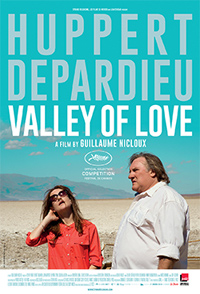Guilt Trip: Nicloux Reunites French Icons for Journey Through the Desert
 Director Guillaume Nicloux reunites French acting legends Isabelle Huppert and Gerard Depardieu for his latest feature, Valley of Love, an enigmatically constructed drama tending to defy easy categorization as it unfolds. Notably, this is the first film starring the duo since Maurice Pialat’s excellent 1980 drama, Loulou. Cast as a divorced couple here, it at first seems they’re playing vague caricatures of themselves, people sharing names, professions, and notable reputations comparable to their real live scenarios. But such a droll assumption is not the case and Nicloux steers clear of comfortable laughs as the film develops a somber narrative taking us down a (sometimes irritatingly) mysterious spiritual path.
Director Guillaume Nicloux reunites French acting legends Isabelle Huppert and Gerard Depardieu for his latest feature, Valley of Love, an enigmatically constructed drama tending to defy easy categorization as it unfolds. Notably, this is the first film starring the duo since Maurice Pialat’s excellent 1980 drama, Loulou. Cast as a divorced couple here, it at first seems they’re playing vague caricatures of themselves, people sharing names, professions, and notable reputations comparable to their real live scenarios. But such a droll assumption is not the case and Nicloux steers clear of comfortable laughs as the film develops a somber narrative taking us down a (sometimes irritatingly) mysterious spiritual path.
A long tracking shot of Isabelle (Huppert) as she walks over a winding pathway to her motel room opens the film. She’s alone, seemingly waiting for someone in Death Valley, California, struggling to get reception on her cellphone as she avoids conversing with the American denizens. Soon, Gerard (Depardieu) shows up and we learn they were once married, decades ago, and the reason for their rendezvous now is at the request of their dead son, a man who killed himself months prior but sent separate letters asking them to journey through the Death Valley tourist sites on a set schedule. During one of their appointed visits, their son promised he would make some kind of physical appearance to them, but it requires both to be there.
Nicloux won the Best Screenplay award at last year’s Tribeca Film Festival for The Kidnapping of Michel Houellebecq shortly after premiering a remake of Jacques Rivette’s The Nun, which starred Huppert. Having directed films since the early 1990’s, Nicloux has finally began to receive wider international acclaim, and Valley of Love finds him expanding and experimenting an increasingly unpredictable tone.
For the most part, this is a dialogue driven two-hander seemingly customized for Depardieu and Huppert. It’s still unfathomable to see Depardieu’s physical transformation, something sometimes distracting in his more serious vehicles. But between their pleasant, even moderately bitchy exchanges, emotional undercurrents creep though and crack the surface of initial clichés. Sequences involving the parents reading out loud the final letters their son had written for the other are quite effectively moving, particularly from Huppert’s cold, distant mother, guilt ridden by her grief.
The camera lingers insistently on these stars, so much so it often seems like we’re not able to differentiate at all between the Death Valley sites. And yet, perhaps those sites don’t even matter, because the closed frame reigns us in—we’re wondering just how exactly this is going to unfold, whether or not the son will be making some kind of physical appearance. Besides, the few times we include others in their journey often result in the film’s ungainly moments, such as a dinner with an unremarkable husband and wife professing to be fans of the actors. Instead, Nicloux treats us to spattered moments of hysteria, resulting in an eerie nighttime interaction with Depardieu on a tennis court, and a bizarre dash through rocky terrain.
Valley of Love begins to take on a spiritually evocative pattern, and many will be irritated by Nicloux’s abject unwillingness to define exactly what it is that’s going on. But this is what makes the film into a rather beautiful, melancholy poem about guilt, grief, and the tragedy of expectation. This Gerard and Isabelle, paired with the specter of their child, somewhat recall echoes of George and Martha from Who’s Afraid of Virginia Woolf?, a pair writhing through their own self-inflicted punishments. In their combined pantheon of notable performances stretching over decades of cinema, perhaps neither Huppert nor Depardieu will be distinctly remembered for the defiant Valley of Love, but it’s a fascinating title deserving of deliberation.
Reviewed on May 21 at the 2015 Cannes Film Festival – Main Competition. 93 Mins.
★★★★/☆☆☆☆☆


